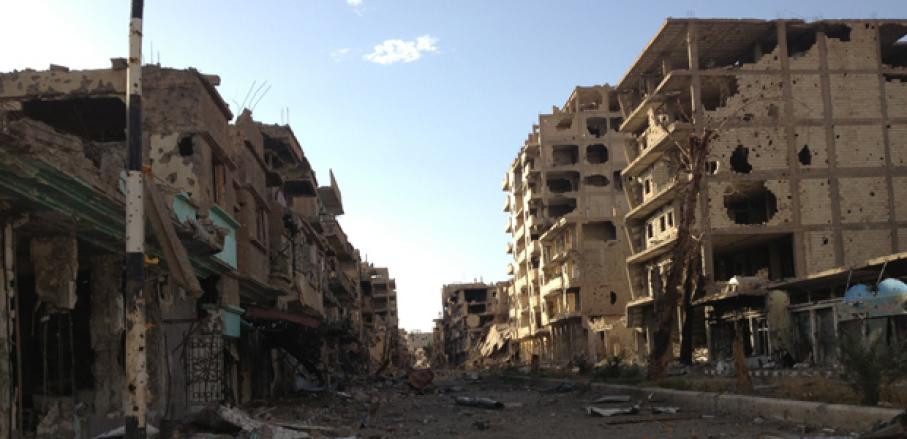PHOTO: Deir ez-Zor lies on the route from Iraq to Islamic State positions inside Syria
LATEST
TUESDAY FEATURE
Syria Feature: “It’s an Inferno” — The Pro-Assad Assault on Wadi Barada
The Islamic State has surrounded regime forces in Syria’s 7th-largest city, Deir ez-Zor, and the nearby military airport.
ISIS launched the offensive on Saturday to seize remaining pro-Assad areas of the city, located in eastern Syria near the Iraqi border. It quickly took key positions inside Deir ez-Zor, divided since 2015, and close to the airport, including the Engineering housing complex.
Observers reported yesterday that ISIS closed on the northern perimeter of the airport, cutting the route from the city, and the Deir ez-Zor governor, Mohammad Ibrahim Samra, acknowledged on State TV that clashes were taking place on the airbase road. Fighting was also reported around the city cemetery and the Panorama Roundabout, south of the city.
The number of casualties on each side is unverified. Syrian State news agency SANA insisted that the army had killed “dozens” of Islamic State fighters in operations southeast of Deir ez-Zor before referring to the ISIS attacks : “The army units in Deir ez-Zor city clashed with ISIS terrorists at the southern entrance of the city and the road leading to military airport.”
However, the pro-regime site Al-Masdar warned, “The situation in Deir ez-Zor has never been this dire for the Syrian Arab Army, as they now find themselves completely surrounded by…ISIS at the strategic military airport.”
Helicopters are now unable to land and resupply regime forces, because of ISIS’s control over the Tharda mountain and nearby hills.
Units in DeirEzzor are the Republican Guard, 17th Division, local/tribal NDF, Galilee Forces (Palestinian) & Hezbollah (advisory role)
— Hassan Ridha (@sayed_ridha) January 17, 2017
The Islamic State controls most of Deir ez-Zor Province and more than half of the city. It has launched periodic attacks over the past two years and besieged the remaining districts. The regime’s position has been sustained by regular Russian and regime airdrops to about 200,000 people.
ISIS has been pushed back in much of its territory by a combination of Kurdish-led and Turkish-rebel offensives in northern Syria. However, it struck back in December, recapturing the ancient city of Palmyra in central Syria from the regime. It still controls the city of Raqqa, and it is holding onto its main position in Aleppo Province, the town of al-Bab, despite a six-week Turkish-rebel offensive.
Iran: No US at Political Talks
Iranian Foreign Minister Mohammad Javad Zarif said on Tuesday that the US should not be present at the Syrian political talks in Kazakhstan next week.
Russia and Turkey, who have brokered the discussions between the Assad regime and the Syrian opposition and rebels, said they had decided to invite Washington.
But Zarif declared, “We have not invited them, and we are against their presence.”
The US, who pursued a political resolution for more than three years alongside Russia, has been sidelined as Moscow turned to Turkey, which had been a major backer of the opposition and rebels.
Iranian President Hassan Rouhani, speaking on Tuesday at a news conference on State TV, said:
Iran, Russia and Turkey managed to bring a ceasefire to Syria….It shows these three powers have influence.
The [Syrian] armed groups have accepted the invitation of these three countries and are going to Astana.
Asked why the US and Saudi Arabia have no direct role in the talks, Rouhani said, “Some countries are not attending the talks, and their role was destructive. They were helping the terrorists.”
Rebel Factions Agree to Participate in Political Talks
Some of Syria’s leading rebel factions have agreed to participate in political talks next week with the Assad regime in Kazazhstan.
The factions said on Monday that Mohammad Alloush, a senior official in Jaish al-Islam, will be chief negotiator.
Other factions, including Ahrar al-Sham, reportedly will not be involved.
Russia and Turkey have brokered the process for the discussions, which they say will begin January 23. Ankara is said to have pressed the rebels to attend, even though pro-Assad forces have not adhered to a December 29 ceasefire and despite reservations that President Assad will make no concessions and will not step down for a transitional government.
“The factions will go and the first thing they will discuss will be the matter of the ceasefire and the violations by the regime,” said a Free Syrian Army official. “This will be a test for the Russians as the guarantor.”
Zakaria Malahifji of the Fastaqim Union said: “The majority of the groups decided to attend. Discussions will be on the ceasefire — the humanitarian issues — aid deliveries, release of detainees.”
A local pro-opposition source indicated that rebel factions do not expect a resolution, but are attending to test how serious Russia and the regime are about discussions of a working ceasefire and aid to besieged areas.
If Russia and the regime do not make those commitments, then “the best we can do to support the just cause is explaining how regime side doesn’t stick to their word, sabotaging the talks”, the source said.
However, civil society groups in Wadi Barada, the area northwest of Damascus which has been under assault since December 22 by Hezbollan and regime forces, criticized the decision
See Syria Feature: “It’s an Inferno” — The Pro-Assad Assault on Wadi Barada
The Vice President of the Syrian National Coalition’s interim government, Wajih Juma, testified to Ankara’s role in getting the opposition to participate:
Turkey has been able to achieve good work in its efforts to declare a ceasefire, which is a chance to protect civilians from killing and ease the return of some to their homes….Turkey is working to preserve security and stability in the region, and for that reason it is working hard for the success of the Astana negotiations which are preparatory for the coming Geneva meetings.

